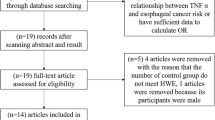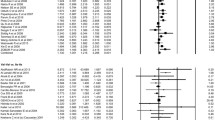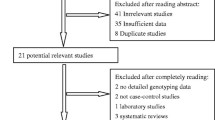Abstract
Objective
IL-8-251A>T polymorphisms have been reported to influence the risk for breast cancer in many studies; however, the results still remain controversial and ambiguous. The aim of this study was to determine more precise estimations for the relationship between IL-8-251A>T polymorphisms and the risk for breast cancer.
Methods
Electronic searches for all publications were conducted on association between this variant and breast cancer in several databases through November 2010. Crude odds ratios (ORs) with 95% confidence intervals (CIs) were calculated to estimate the strength of the association. Six studies were identified, including 1,880 breast cancer patients and 2,013 controls.
Results
Overall, no significant associations between IL-8-251A>T polymorphism and breast cancer (codominant model: TA vs. AA OR = 1.075, 95%CI = 0.864–1.337; TT vs. AA, OR = 0.900, 95%CI = 0.598–1.354; dominant model: OR = 1.011, 95%CI = 0.783–1.304; and recessive model: OR = 0.854, 95%CI = 0.623–1.171). In the subgroup analysis by ethnicity, significantly decreased risk was found for Africans (TT vs. AA OR = 0.541; 95%CI = 0.396–0.741; dominant model: OR = 0.737, 95%CI = 0.570–0.953; recessive model: OR = 0.594; 95%CI = 0.459–0.768). In the stratified analysis by control sources, significant association was observed in population-based studies (recessive model: OR = 0.692; 95%CI = 0.566–0.861).
Conclusions
This meta-analysis suggests the IL-8-251A/T polymorphism is associated with breast cancer risk.
Similar content being viewed by others
References
Cochran WG (1954) The combination of estimates from different experiments. Biometrics 10:101–129
De Jong MM, Nolte IM, Meerman GJ, van der Graaf WT, Oosterwijk JC, Kleibeuker JH, Schaapveld M, de Vries EG (2002) Genes other than BRCA1 and BRCA2 involved in breast cancer susceptibility. J Med Genet 39:225–242
DerSimonian R, Laird N (1986) Meta-analysis in clinical trials. Control Clin Trials 7:177–188
Higgins JPT, Green S (2008) Cochrane handbook for systematic reviews of interventions. Cochrane Collaboration and John Wiley
Hull J, Thomson A, Kwiatkowski D (2000) Association of respiratory syncytial virus bronchiolitis with the interleukin 8 gene region in UK families. Thorax 55:1023–1027
Kamali-Sarvestani E, Aliparasti MR, Atefi S (2007) Association of interleukin-8 (IL-8 or CXCL8) −251T/A and CXCR2 +1208C/T gene polymorphisms with breast cancer. Neoplasma 54:484–489
Liu JY, Zhai XJ, Jin GF et al (2007) A study of relationship between polymorphisms of interleukin-8 and risk of breast cancer in Chinese population. China Cancer 16:8–10
Mantel N, Haenszel W (1959) Statistical aspects of the analysis of data from retrospective studies of disease. J Natl Cancer Inst 22:719–748
Mukaida N, Shiroo M, Matsushima K (1989) Genomic structure of the human monocyte-derived neutrophil chemotactic factor IL-8. J Immunol 143:1366–1371
Ohyauchi M, Imatani A, Yonechi M et al (2005) The polymorphism interleukin 8-251 A/T influences the susceptibility of Helicobacter pylori related gastric diseases in the Japanese population. Gut 54:330–335
Parkin DM, Bray F, Ferlay J, Pisani P (2005) Global cancer statistics 2002. CA Cancer J Clin 55:74–108
Ponder BA (2001) Cancer genetics. Nature 411:336–341
Smith KC, Bateman AC, Fussell HM, Howell WM (2004) Cytokine gene polymorphisms and breast cancer susceptibility and prognosis. Eur J Immuno genet 31:167–173
Snoussi K, Mahfoudh W, Bouaouina N et al (2006) Genetic variation in IL-8 associated with increased risk and poor prognosis of breast carcinoma. Hum Immunol 67:13–21
Snoussi K, Mahfoudh W, Bouaouina N et al (2010) Combined effects of IL-8 and CXCR2 gene polymorphisms on breast cancer susceptibility and aggressiveness. BMC Cancer 10:283
Taguchi A, Ohmiya N, Shirai K, Mabuchi N, Itoh A, Hirooka Y (2005) Interleukin-8 promoter polymorphism increases the risk of atrophic gastritis and gastric cancer in Japan. Cancer Epidemiol Biomarkers Prev 14:2487–2493
Thakkinstian A, McElduff P, D’Este C, Duffy D, Attia J (2005) A method for meta-analysis of molecular association studies. Stat Med 24:1291–1306
Vogel U, Christensen J, Nexo BA et al (2007) Peroxisome proliferator-activated receptor-gamma2 Pro12Ala, interaction with alcohol intake and NSAID use, in relation to risk of breast cancer in a prospective study of Danes. Carcinogenesis 28:427–434
Weber BL, Nathanson KL (2000) Low penetrance genes associated with increased risk for breast cancer. Eur J Cancer 36:1193–1199
Conflict of interest
None.
Author information
Authors and Affiliations
Corresponding author
Rights and permissions
About this article
Cite this article
Huang, Q., Wang, C., Qiu, LJ. et al. IL-8-251A>T polymorphism is associated with breast cancer risk: a meta-analysis. J Cancer Res Clin Oncol 137, 1147–1150 (2011). https://doi.org/10.1007/s00432-011-0981-5
Received:
Accepted:
Published:
Issue Date:
DOI: https://doi.org/10.1007/s00432-011-0981-5




